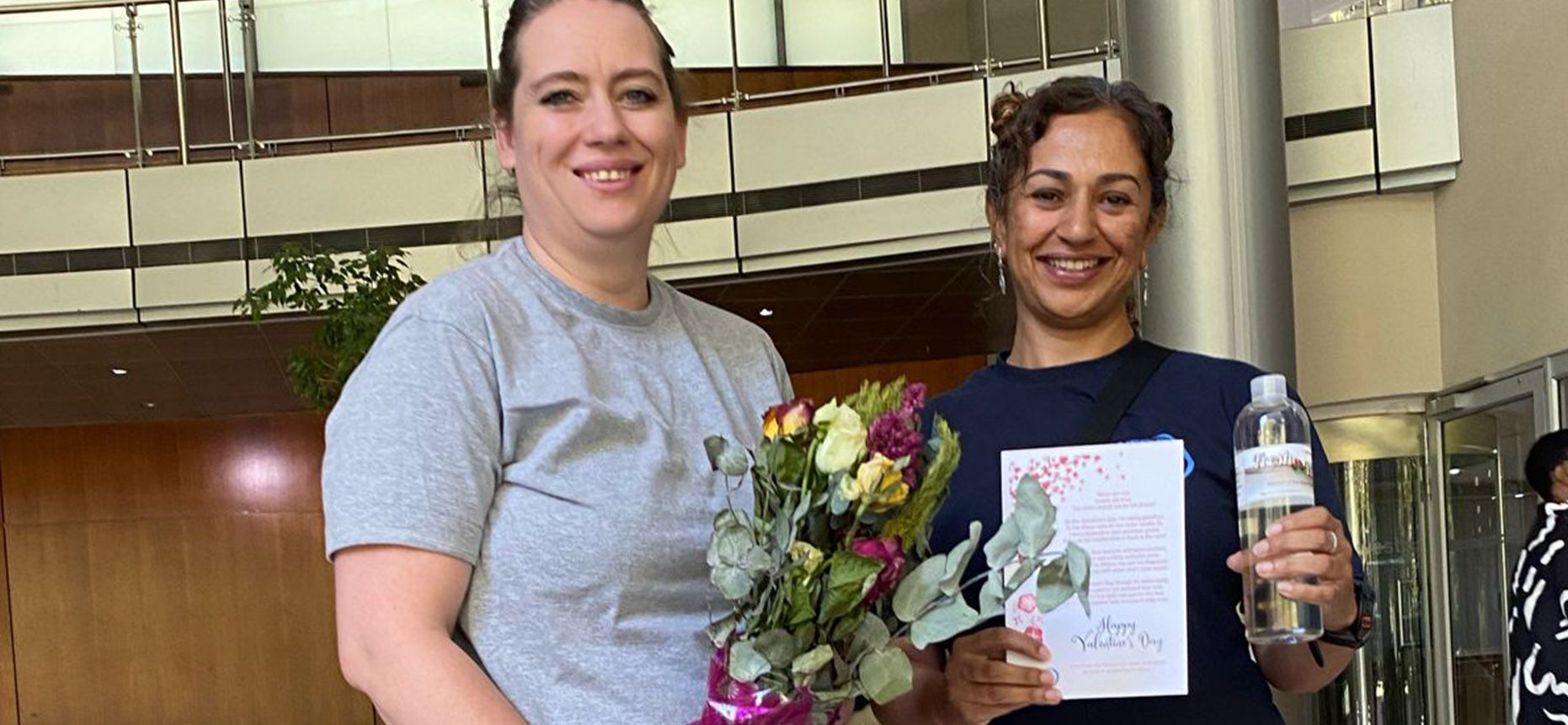.
FEBRUARY: A BUSY MONTH FOR OUR WATER WARRIORS
From special Valentine’s Day “gifts” to the mayors of five municipalities where serious water pollution is occurring, to investigating why Johannesburg residents’ receive excessive bills for water usage despite being without water for days and raising the alarm when a herbicide was sprayed on the Vaal River, forcing an investigation into the debacle.
On Monday, 12 February, Rand Water confirmed its intention to use glyphosate over the Vaal River as part of an effort to get rid of a water lettuce and hyacinths, two invasive plant species threatening ecosystems in the river.
Despite assurances that this action is being undertaken in accordance with the approved General Authorisation from the Department of Water and Sanitation and with technical guidance from the Department of Forestry, Fisheries, and the Environment, WaterCAN raised the alarm about the use of pesticides on one of the country’s most important sources of water. A day later, the spraying stopped. Beetles that eat only water lettuce has since been released to curb the infestation.
But how can future infestations of the Vaal (and other water sources) be prevented?
WaterCAN believes that a multifaceted approach is needed. One of the critical components is tackling sewage pollution flowing into the river. The nitrates present in sewage serve as fuel for the rapid growth of water lettuce. By addressing sewage pollution at its source, we can mitigate the nutrient influx that exacerbates the proliferation of invasive aquatic plants. Read more here.
Dr Ferrial Adam, executive director of WaterCAN, was not convinced that all the necessary permissions were obtained. On the 18th of February it was indeed announced that the Ministers of Forestry, Fisheries and the Environment, Barbara Creecy, and Water and Sanitation, Senzo Mchunu, met with relevant parties as part of a probe into the use of the pesticide. Read more here.
Both OUTA and WaterCAN are on record calling for drastic steps against municipal managers in charge of municipalities who repeatedly fails to deal with sewage pollution. We advocate for the prosecution of municipal managers in their personal capacity if they fail to do their jobs in this regard. Fining the municipality is simply not enough, because in the end residents will have to fork out even more to pay the fine. “The time to hold those in charge of protecting our water security accountable, is long overdue,” Dr Adam said.

WILTED FLOWERS, DIRTY WATER AND THE DIRE CONDITION OF SA’S WATER
On Valentine’s Day, mayors representing the City of Cape Town, the City of Johannesburg and the Emfuleni, Dipaleseng and eThekwini municipalities were each presented with a symbolic package containing wilted flowers, a bottle of contaminated water, and a breakup letter from WaterCAN and other water guardians from across South Africa.
“Our breakup letter and the accompanying gifts of water and wilted flowers serve as a stark representation of the degradation of our water resources and the ecosystems they support,” said Dr Ferrial Adam, Executive Manager of WaterCAN.
With this gesture, WaterCAN wanted to put the spotlight on the dire condition of the country’s drinking water and rivers, as highlighted in the Blue, Green, and NoDrop reports released in November 2023 by the Department of Water and Sanitation. These reports reveal alarming statistics: 46% of drinking systems fail to meet microbiological standards, 67.6% of wastewater treatment works are inoperable, and 47.4% of our water is lost or unaccounted for.
The selected mayors symbolise the challenges faced by many municipalities nationwide. Emfuleni grapples with ongoing sewage pollution in the Vaal River, Cape Town discharges nearly 32 million litres of untreated sewage into marine protected areas, while the tap water in Dipaleseng in Mpumalanga remains unsafe for consumption. The City of Johannesburg contends with failing infrastructure, water cuts, and a significant flow of sewage into rivers, and eThekwini experiences failing infrastructure leading to water cuts and uncontrolled sewage outflows into rivers, impacting critical beaches. You can read more about this here.
IS YOUR WATER METER BILLING YOU FOR AIR? TELL US!
WaterCAN has received numerous complaints from individuals across South Africa, expressing concerns about being billed for air that runs through their water meters instead of actual water. We understand the importance of addressing this issue promptly and accurately. In order to assess the extent of this problem and better advocate for a resolution, we need your input. Please click here and fill in the questionnaire to help determine the scope of the issue.
Carte Blanche investigated why scores of households are literally paying for the air in their water pipes, instead of the water they consume. Watch the episode here.
